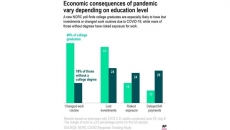As cardholders experience financial difficulties due to COVID-19, some credit card issuers are promoting their hardship programs.
Once a well-kept secret, these programs are now more prominently advertised, offering things like deferred payments and lower interest rates. But not all cardholders will qualify or receive favourable terms.
If you’ve been denied COVID-19 relief, if it’s insufficient, or if your relief terms are expiring, consider turning to a non-profit credit counselling agency. Credit counsellors may be able to help you with get-out-of-debt options — among them, possibly, a debt management plan, which rolls several balances into a single payment at a lower interest rate.
“It essentially works as a consolidation loan without creating a new loan,” says Thomas Nitzsche, a spokesperson for Money Management International, a non-profit credit counselling agency.
Here’s what to know about this kind of assistance.
HARDSHIP PROGRAMS VS. DEBT MANAGEMENT PLANS
Credit card hardship programs are ideal for balances that can be paid down over a few months. Terms vary by issuer, and relief is generally granted on a case-by-case basis. To determine your eligibility, you must contact your card issuer.
Debt management plans are better suited for long-term debt that can take up to five years to pay. They consolidate different balances like unsecured loans, certain kinds of medical debt and credit cards into one payment at a fixed rate, according to Nitzsche.
You wouldn’t go through your card issuer directly for such a plan, but a third-party credit counselling agency may suggest it for you, if you qualify, and set it up with the issuer. Credit history isn’t a factor for eligibility, but you do typically need a regular income to show you can contribute payments that meet the plan’s terms. One missed payment may dissolve a debt management plan.
There are also usually fees involved with a debt management plan, which can vary based on factors like where you live. But fees may be negotiable, and your savings will typically outweigh the cost.
‘I DON’T HAVE TO TALK TO THE CREDITORS ANYMORE’
Unlike a hardship program, a debt management plan may also save you time. For Helen Kerins, a New Jersey-based YouTuber at the channel Krazy Kerins, the best part was letting the credit counselling agency negotiate with issuers. “I don’t have to talk to the creditors anymore,” she says.
Kerins, 42, had already used a debt management plan in her 20s to pay off creditors, but she acknowledges that afterward her habits didn’t fully change. By 2016, though, her priorities were different as a wife and new mom, and she was determined to tackle almost $44,000 in debt.
She contacted a credit counsellor and submitted credit card statements, account numbers, contact information and other details. Together they discussed her options over the phone and determined that a debt management plan was fitting. (Credit counsellors may offer other options or resources for budgets in the red.)
After the agency reached out to Kerins’ credit card issuers, she got a significant break on interest, and her monthly outlay toward that debt fell sharply, too.
Before, “I was paying close to like $700 or $800 a month in just my credit cards,” Kerins says. The debt management plan got that figure down to about $475 a month total, and that included the $25 monthly service fee charged by the counselling service.
IT’S POSSIBLE TO COMBINE RELIEF OPTIONS
If, say, only some of your creditors are offering you hardship relief directly, you could potentially enrol the other accounts in a debt management plan.
“The (debt management plan) is pretty flexible,” Nitzsche says. “You can add or remove creditors at any time for any reason.”
Relatedly, even if you may have been previously enrolled in, or denied for, a hardship plan, that doesn’t typically deter issuers from offering affordable terms through a debt management plan. Spokespersons at American Express and Wells Fargo, for instance, confirmed that those issuers are willing to work with such cardholders.
With either kind of plan, you may have to stop using your credit cards. Your issuer may even close them. But even then, you may have other options.
In Kerins’ case, monthly payments were automatically debited from her bank account, and she whittled almost $44,000 in debt down to $10,000. Her husband then used his own good credit to qualify for credit card balance transfer offers, and she moved her balance onto those cards to save more money and accelerate the debt repayment.
She finished paying off that debt entirely in December 2019.
_______________________________






